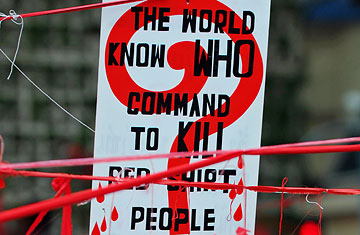
Red Shirt demonstrators attend a rally in Bangkok on Dec. 19, 2010, seven months after a police crackdown on their anti-government protests
Thailand's Cabinet lifted an official State of Emergency in Bangkok and four neighboring provinces on Tuesday, signaling the automatic disbanding of a joint military-civilian committee responsible for national security since April. The move was a first step toward possible national elections in the early part of next year, as Prime Minister Abhisit Vejjajiva had made a "return to normalcy" a precondition for early polls. Human rights activists and government opponents, however, remain concerned about what they say is the creeping influence of the military in governing a country regarded until relatively recently as a stable democracy in Southeast Asia.
Although the lifting of the State of Emergency will take effect on Wednesday, the military has already requested it be replaced temporarily by the Internal Security Act (ISA), a law slightly less stringent than the emergency decree but that still allows the government and security officials wide latitude in suppressing civil rights, political and other activities to maintain order. "We welcome the lifting of the State of Emergency, but we are concerned that it is being replaced by the ISA," said Benjamin Zawacki, the Thailand representative of Amnesty International. "The fact that the government would grant the military's request to invoke the ISA shows that the military is clearly ascendant and more powerful than at any time since [the early 1990s]."
The end of emergency rule came eight months and two weeks after Prime Minister Abhisit Vejjajiva invoked an emergency decree on April 7, after anti-government Red Shirt protesters overran parliament, stripped security guards of their weapons and forced lawmakers to flee. The Red Shirts were demanding Abhisit resign and call new elections, claiming he came to power through backroom parliamentary deals and so was illegitimate to hold the premiership.
As tens of thousands of Red Shirts descended upon Bangkok, the State of Emergency was eventually extended to 24 of the country's 76 provinces. When Abhisit failed to reach a compromise with the Red Shirts — many of whom were demanding the return of Thaksin Shinawatra, a former prime minister ousted in a 2006 bloodless military coup — the military moved in and dispersed the protesters who burned more than 30 buildings in Bangkok as they retreated on May 19. During two months of demonstrations that shut down Bangkok's central business district, a total of 91 people were killed, including 11 soldiers, and more than 1,400 wounded.
Even with the State of Emergency in effect, Red Shirts and other groups had staged several demonstrations in recent weeks, including the past weekend. Abhisit noted, however, that the gatherings had been peaceful and so considered them normal political activity within the constitutionally guaranteed rights of Thais. Dozens of top Red Shirts leaders, arrested in May, remain incarcerated and awaiting trial, while others have fled the country.
The lifting of emergency rule mandates the dissolution of the Center for the Resolution of the Emergency Situation, a committee of senior military officers, security officials and government ministers that some had regarded as a shadow government wielding more power than the Prime Minister or elected representatives.
The invocation of the committee and the violence and chaos surrounding the protests and their dispersal had led many to predict that Thailand's economy, and particularly its tourism sector, would suffer greatly this year. But the World Bank recently forecast nearly 8% economic growth for 2010 on the back of vigorous exports, and the Tourism Authority of Thailand said the country is on track to receive more than 15 million visitors this year, about a 10% increase over the previous year.
